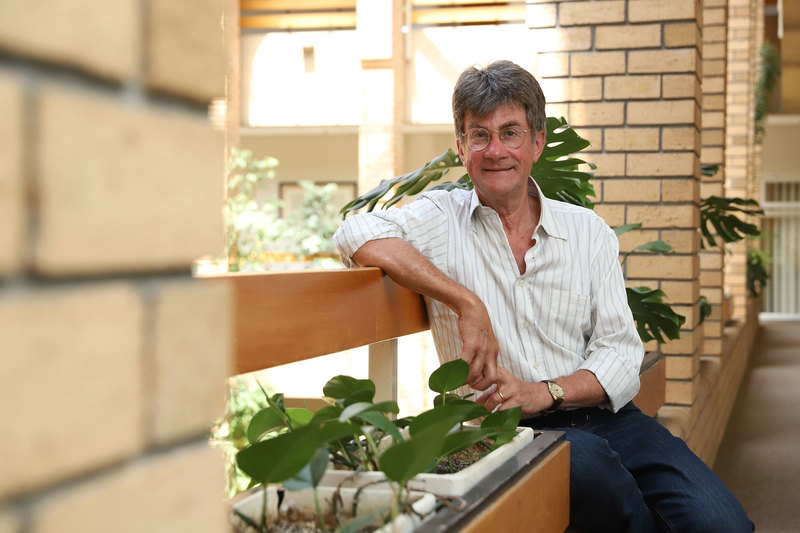Hugh Corder: a man for all seasons
16 November 2020 | Story Helen Swingler. Photo Michael Hammond. Read time >10 min.
Veteran law scholar and activist Professor Hugh Corder well remembers his BCom LLB graduation at the University of Cape Town (UCT). It was 16 June 1976. Afterwards, he travelled north to what is now Mpumalanga, passing Soweto. The smoke was still rising.
In December 2019, more than 43 years later, Professor Corder was at another graduation. This time he was honouring his Zimbabwean PhD student, Dr Musa Kika.
It was a moment to reflect, he said.
Corder’s association with UCT as a student, an alumnus and an academic has spanned every decade since the 70s. The changes evident in 2019 were perceptible in the doctoral celebrants – black PhDs from South Africa, the Cameroon, Tanzania, Kenya and Zimbabwe – a collective in vivid red. Impossible in 1976.
Steadying the ship
That ceremony was meant to conclude his long and venerable career with tours of duty in various departments and faculties and in the executive. Instead, in January 2020, he stepped in as interim director of the UCT Graduate School of Business until the new director joined in September.
He has been acting dean of Law (in 2018, having served as dean from 1999 to 2008), the ‘guinea-pig’ director of Postgraduate Studies (2012) and served two stints as acting deputy vice-chancellor between 2016 and 2018 during the turmoil of the Must Fall campaigns. His versatility, institutional insights, commitment and contributions to his alma mater are inestimable.
Now, he has started a year-long post-retirement contract as a professor of law, to supervise his 11 doctoral students and to make up for lost ground on his research.
“From a professional viewpoint, he could have died a happy man right then.”
It has been a marathon haul, with many rewards, he said. The “absolute highlight” beyond the university was when Corder brought his skills as a law scholar to the drafting of South Africa’s interim and final Constitutions. From a professional viewpoint, he could have died a happy man right then, he said.
Early politicisation
Corder was politicised much earlier. He was a student volunteer for the Border Council of Churches (BCC) in mid-1974. The BCC was assisting black communities who’d been forcibly removed from “black spots” in white rural areas and resettled in Dimbaza in the former Ciskei. He boarded with a local priest in King William’s Town, where the BCC had an office.
“That’s where Steve Biko, Mamphela Ramphele, Malusi Mpumlwana and a lot of really radical South African Students’ Organisation people were. They’d all been banished to that area.”
Meeting Biko changed his life, he said.
“We agitated for labour law as an optional course. And we achieved that in 1977.”
He’d also joined the National Union of South African Students (NUSAS), a “radical” anti-apartheid movement. In 1978 he ran a NUSAS campaign on legal education and legal aid. At UCT he was on the RAG exco and president of the Law Students’ Council.
“In the mid-1970s UCT law students were demanding relevance in their legal education,” he recalled. “We agitated for labour law as an optional course. And we achieved that in 1977.”
Studies abroad
After graduating with a BCom LLB, Corder returned as a tutor in 1978. He then won a Kramer Grant to the University of Cambridge where he did a postgraduate degree by coursework.
In 1979 he took up a Rhodes Scholarship at the University of Oxford to pursue doctoral research on the role and attitudes of South Africa’s appellate judiciary, 1910 to 1950. After he returned home in 1982, his research was published as a book titled Judges at Work. It was politically risky but avoided banning.
Hoping for a post at UCT, Corder was instead scouted by Stellenbosch University where he enjoyed “four incredible years”. It was his close relationship with several top Afrikaans academics that later proved pivotal.
Chair in Public Law
At the end of 1986, UCT advertised the Chair in Public Law, and Corder was offered the job from mid-1987.
Along with that came membership of Senate, his 33 years of meetings charting highs and lows of a university wrestling with transformation. Three meetings stand out: the first when Irish academic Conor Cruise O’Brien broke the academic boycott of South Africa in 1987, calling it a “Mickey Mouse affair”. UCT withdrew its invitation for him to speak.
“He was being deliberately provocative,” said Corder. UCT later asked Ismail Mahomed and Arthur Chaskalson, both of whom became chief justices, to chair an inquiry – their report was tabled at Senate in August 1987.
“It was a very divisive issue, and I had the complete chutzpah to speak at my very first Senate meeting in favour of the Chaskalson/Mahomed Report, which found [that] UCT had acted correctly in the circumstances, to prevent O’Brien from speaking.”
But Corder said there’s a deep irony because on 22 November 2019, at his last Senate meeting (the second big meeting he referred to), the Israeli academic boycott motion (passed in March) was rescinded. And he’d moved to rescind the motion.
“I did so for a range of complex reasons. Among these were the damaging effects of the academic boycott among progressive academics in the 1980s.”
“I think probably the majority of members who attended initially thought, ‘Not over our dead bodies is that statue going to move.’ ”
Third, and perhaps the most significant Senate meeting, was the one to discuss whether Senate should support the removal of the Cecil John Rhodes statue from upper campus.
“I think probably the majority of members who attended initially thought, ‘Not over our dead bodies is that statue going to move.’ But a robust and frank debate in which, to their enormous credit, the students resorted to rational argument rather than threats and rhetoric, just swayed everybody.”
In the end, there were 182 votes for and only one against.
Drafting a Constitution
One of his most important achievements followed from a 1991 sabbatical.
Corder researched and published about administrative law, judicial selection and Parliament’s role in overseeing the Cabinet and executive. Following the Convention for a Democratic South Africa (CODESA) in 1991 and 1992, the multiparty negotiating process started at the World Trade Centre in Kempton Park in 1993. Partly as the result of his research, but also because of several meetings with the ANC in exile in 1988/9, Corder was asked to join the technical committee that drafted the first Bill of Rights.
“So, I was the only one on the committee of four that had ever really grappled with how to draft a bill of rights.”
“The year before, in 1992, a group of eight academics and practitioners from the Western Cape had drafted our own proposal for a bill of rights called A Charter for Social Justice. So, I was the only one on the committee of four that had ever really grappled with how to draft a bill of rights.”
The model adopted in their proposal was followed in the constitutions. It was his close friend Edwin Cameron who quickly persuaded him that sexual orientation should not be grounds for discrimination in the Constitution.
“And it wasnʼt actually very difficult to persuade my colleagues.”
Moves and revolts
Corder has also seen many changes at UCT. During Dr Mamphela Ramphele’s vice-chancellorship, UCT shifted to an executive leadership model from the beginning of 1999. The faculties were reduced from 11 to six.
“Law fought really hard to retain our faculty status. And we did.”
During his deanships, the faculty faced two major challenges. First, the move to their own building on middle campus. Corder had to allay the fears of those reluctant to leave upper campus. Second, the need for alumni engagement and the establishment of an endowment were high priorities. Both these objectives were achieved by the end of 2008.
Having declined an invitation to apply for a deputy vice-chancellorship during Dr Max Price’s tenure as vice-chancellor, Corder returned to scholarship and teaching. But from 2016 to 2018 he twice served as an acting deputy vice-chancellor.
It was a time of disruption on campus through the Must Fall campaigns, which took their toll. It was perhaps the lowest point of Corder’s career. He emphasised that he could have achieved nothing without his wife, Catherine, and their five children. The massive impact of those years on his family is what caused most distress.
His eldest son, Daniel, commented one day on his father’s long stints in emergency sessions, putting out fires (some literal) on campus. He pinpointed the cause of his father’s anguish and growing distraction.
“Dad, you’re heartbroken.”
“I’ve learned a lot, and we’ve gradually begun to restore a degree of civility and respect for human dignity.”
He was right, Corder said. “I’d just never seen it that way. I think the thing that upset most people was, for understandable reasons, the sometimes completely confrontational, disrespectful and non-collegial behaviour among staff and students.
“It was a great wake-up call. I’ve learned a lot, and we’ve gradually begun to restore a degree of civility and respect for human dignity.”
Transformation in the Law faculty
What would he have done differently?
“Nothing!”
He added: “We’ve had outstanding students in the law faculty from the beginning. We’ve become the continent’s pre-eminent faculty ... So, we can attract brilliant students from very diverse backgrounds in this country and the rest of Africa.”
As a result, the faculty has changed. In 1977 there were three white women and two people of colour in his LLB class; there were no female lecturers.
“Now the final-year class is completely different in terms of demographics. About two thirds of academic staff are women, and we’ve had two women deans in a row.
One thing hasn’t changed. Corder has given the same last lecture to the final-year LLB students since 1987, using the same texts to inspire the vision of law as a service to humanity. And he always sings the chorus from Tracey Chapman’s “All you have is your soul”.
“Don’t be tempted by the shiny apple
Don’t you eat of a bitter fruit
Hunger only for a taste of justice
Hunger only for a world of truth
’Cause all that you have is your soul.”
It’s this ‘soul’ that Vice-Chancellor Professor Mamokgethi Phakeng referred to when she reflected on Corder’s manifold contributions to UCT.
“Hugh is the epitome of a mensch,” she said. “We have needed and benefitted from his ability to be deeply analytical but deeply human and deeply caring, particularly during the very demanding years from 2015 to 2017.
“First as a deputy vice-chancellor at UCT and later vice-chancellor, I came to admire Hugh’s pragmatic style, his conscientiousness and his meticulously fair way of dealing with people and situations. It was at times easy to forget his contributions to the scholarly enterprise at UCT and his influence on many top law scholars who took their lead from his example. We shall miss his wisdom enormously and thank him for so many contributions to this university. From all of us at UCT, hamba kakuhle, Tata uHugh. Syabulela.”
 This work is licensed under a Creative Commons Attribution-NoDerivatives 4.0 International License.
This work is licensed under a Creative Commons Attribution-NoDerivatives 4.0 International License.
Please view the republishing articles page for more information.










